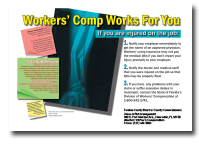
The employees performing their job at the workplace may encounter with sudden injuries and accidents. The companies or the employers are responsible for the injuries or illness caused. They are responsible for making payments to the workers. The employers will make payments to the employees in the form of Workers Comp Exemption .
Benefits provided under the law: The benefits which are provided during injuries and illness are bifurcated by the compensation laws into three categories. However, the advantages provided may vary from jurisdiction to jurisdiction. The medical benefits provided are unlimited and are not deducted from the employee’s earnings. The payments are made from worker compensation fund and are paid directly to the health care provider for the services rendered by them to the employees. The workers have to follow the orders of the doctor. In spite of medical care provided and the billing are taken care of by the treating physician and the worker’s compensation carriers it differs from state to state. In the majority of the jurisdictions, employees have to pick the physician selected by the employer. Few employers allow the employees to choose the physician with limited restrictions. Surgery fees, medical costs, and nursing expenses all are paid from the worker’s compensation fund. Rehabilitation benefits provided by the states differ from each other in terms of amount and to the extent of the service provided.
Rehabilitation benefits may include psychology rehabilitation, vocational rehabilitation, and medical rehabilitation. The rehabilitation expenses are included in the medical benefits making the coverage unlimited. There are circumstances where the employees may not be able to return to the previous employer due to limitations of unavailability of a job for the limitations of the employees. Under such circumstances, vocational rehabilitation is extended to cover the costs of learning new skills or improving the existing skills of the employees. It also includes the cost of education and training program of the employees. The cost incurred for job placement services and the cost necessary to provide job search and interview skills. Travel expenses incurred during medical treatment are also paid under medical benefits.

Indemnity benefits: Apart from paying medical bills payment is also made for the loss of wages as the employees may not be able to perform the job completely or permanently due to injuries and illness. Disability benefits are based on the statutory minimum and maximum weekly payments, the maximum duration of payment and the maximum amount of payments. The severity of injuries is classified as partial or total and the duration of the injury is termed as temporary or permanent. Benefit payments are calculated on the basis of employees average weekly wages for one year. Employees who cause shelf injuries are eliminated from the benefits of disability.
Death benefits: Death benefits cones at last of the worker’s compensation fund. Limited benefits are provided for funeral expenses. The dependents who are eligible will receive the weekly benefits. Standard guidelines are followed in order to collect death benefits. Death must occur within a certain period of time followed by the injury occurred at the scope of the workplace to consider it as a work-related death. A request for death benefit must be applied within a particular period of time. Dependent benefits are also limited and are paid on the basis of workers earnings.

